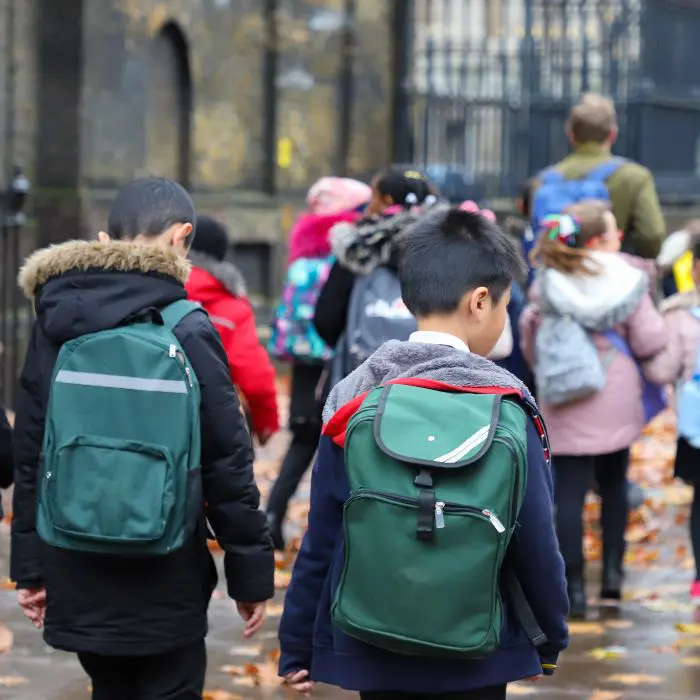Supporting a child when their friend or another student from their school has died

When a child dies, the impact of the death can be widespread, not only for those who were close to or knew the person, but also within the wider community. The death of a school friend or another student can be confusing, frightening, and upsetting for a child.
As an adult, whether you are a parent, carer, or family member, you can help play a key role in helping your child understand and cope with what has happened.
Here is some guidance to help you support a child through a difficult time:
Start by giving honest, factual and age-appropriate information
Children often benefit from clear and simple explanations. If you are the adult telling the child that someone they know has died, find a quiet time and space to tell them. Use clear, direct words such as “died” and “dead,” as opposed to “passed away” or “gone to sleep.” Children can find these words confusing and they might expect their person to be able to wake up from their sleep or come back from being away.
You might say something like: “I have some sad news to tell you. [Name of child/student or ‘a student’ if you don’t know their name] from your school has died. That means their body has stopped working and they can’t come back.”
Find more guidance on telling a child someone has died here.
Your child may have questions, and it’s important to be led by them as and when they want to ask about death and dying. Try to answer their questions as openly as possible, in an age-appropriate way. If you do not know the answers to questions, be honest about this. You could say: “At the moment, I don’t know the answer to that, but I will see if I can find out and come back to you either way.”
Let them know their feelings are valid and you are there to support them
Everyone responds in their own unique way to grief, and this includes children. Some children may cry, seem quiet, ask lots of questions, or act as though nothing has happened.
Let them know that you are there for them whenever they need you, and that they can come to you if they have any questions or if they would like to talk anything through. It may also be important to find out from their school about a contact for the child to go to if they need support during the school day. In some schools, there may be a school nurse, counsellor, designated teacher or teaching assistant they could talk to about how they’re feeling if they become overwhelmed or upset.
Remind them that however they feel is okay. They might not know how they feel or say they feel “nothing” – this is okay too. Other friends and students around them at school may be feeling differently, and that’s completely normal when someone has died. Everyone deals with grief in their own way.

Keep a routine as much as possible, but allow some flexibility
Children often find security in familiar structure and routine. When someone has died, it can sometimes leave children feeling confused and a loss of control over what has happened. Keeping a familiar structure, such as mealtimes and bedtimes, can be comforting to a child during what can be an emotional time in their life.
It’s important to note that some flexibility may be needed. For example, extra time to comfort and talk to a child before bedtime, creating space for questions, or a child may wish to sleep a little earlier or for longer if they are feeling drained and tired from day-to-day activities when they are grieving. Keeping communication open between you and the child is the best way to know what they need most at this difficult time.
Returning to school after a death in the school community
Whether or not the child knew the person who died well, or they were a fellow student, the impact across the school community can affect many students and staff members. They may see others around them sad and upset and lessons and the school environment might feel quite different.
There may be communication from the school regarding the death of the student, and the school may advise on how to help you to tell your child, or it may be announced in a tutor group or assembly depending on the families wishes. If you would like to speak to our bereavement support team about supporting the school, we provide training for schools and professionals as well as our immediate support services to anyone supporting grieving children.
Depending on how this impacts your child, they may wish to take some time to process this information. They may be affected because this bereavement triggers a previous bereavement or if this is their first experience of grief they may be overwhelmed with emotions. Taking time to process might mean having some time off school, or they may wish to go straight back into school to be around their friends, peers and staff for support.
Work with the school
Let the school know if your child is particularly affected or needs support. Teachers, pastoral staff and school counsellors can help monitor their wellbeing and offer them time out spaces and check in’s.
Going back to school after a bereavement can be overwhelming for children; they might feel nervous, sad, or unsure how things will feel or what others might say. Here are a few things to prepare before they go back into school:
- Ask the child how they feel about returning to school. Allow them a space to share any questions or worries they might have and involve them in decisions.
- Talk to the school if the child is struggling. The school may be able to support with regular check ins, a named teacher they can talk to, resources that might help them in lessons, or a space they could go to if they need to take a short break
- Talk through what they could expect. Other students and staff may also be feeling different emotions, and it may feel different without their friend/peer there. Remind that that it’s okay to take breaks if needed, as long as you are able to talk to their school about a space they could go to if they need a break.
- Help prepare them for questions. Other children might ask them questions, “why are you sad?” “What happened?” Help them to think about how they might respond to these questions if they want to and reassure them that they don’t have to if they don’t want to
- Keep open communication and validation. It’s okay to ask gentle open-ended questions such as, “how did it go today?” “Was there anything that felt challenging or went well?” Remind them that it’s okay to feel however they feel and that you are there for them.
- Remind them that they are not alone. Remind them that other children and adults around them are also feeling the impact of the death. Everyone will have their own feelings and emotions and it’s okay to talk if they feel comfortable to.
A death in a school community can sometimes make children worry about their own safety as well as others. They may worry that other people, including themselves may die. They may ask questions such as, “could I die too?”
These questions are normal for children processing a bereavement. Reassure them in a calm and age-appropriate language. You may say something like: “It’s very rare for something like this to happen. Most children stay healthy and well for a very long time, and we have lots of people who help us stay well.”
Avoid promising them that nothing bad will ever happen because nobody can predict that, but you can offer grounded reassurance that their world is safe.
Weekends and school holidays
For some children, being off school and away from the structure and routine of school can feel different when they are grieving. It might feel like they have more time to think, or they might miss their friends and wider support network.
Remind the child of who they can talk to. If they don’t feel like talking to someone in their immediate family or network, let them know about other people and services they could contact. Children of any age can contact us at Winston’s Wish if they would like to talk about anything to do with their grief. They can phone us or live chat with us themselves and they don’t need an adult to authorise their conversation. Scroll to the bottom to find out how to get in touch.
Just because you’re smiling doesn’t mean you’re not grieving
Anonymous
Remind them it’s okay to have fun and enjoy doing the things they like to do. They can be happy, grieving, and still remember the person who has died. Having fun can give them a break from some of the big feelings they might be experiencing. Help involve them in decision making, “what do you feel like doing today?” Children may also change their mind about things more often, and it’s important for them to know that it’s normal to feel indecisive and conflicted about what they want to do. Some children may want to be given some options of things to choose from to do as they may find it harder to come up with their own suggestions and ideas right now.
Weekends and school holidays can be a time for children to switch off from what can often be busy school weeks. When a child is grieving, they may feel even more tired or drained doing their usual day to day activities. Allow them some time to relax and unwind as well as trying to maintain some structure to their weekends and holidays if possible. Some children may wish to keep themselves busy to stop them thinking about how they are feeling and the person who died. Help them find a balance – it’s okay to want to keep busy, but also important to find some time to check in with how they might be feeling. They may want some alone time, or they might want to be close to you or others around them.

Looking after yourself when supporting a grieving child
Supporting a grieving child can be hard. Wondering what the right thing is to say, seeing a child sad or upset, or answering difficult questions can feel challenging.
If you have any questions, or would like to talk something through, our trained bereavement practitioners are available immediately through our services.

Call
Call to speak with a Bereavement Support Worker. Freephone 08088 020 021, 8am to 8pm weekdays (excluding Bank Holidays).

Email us on ask@winstonswish.org or fill out our contact form and we’ll reply within two working days.

Live chat
Chat online with a member of our bereavement team between 8am and 8pm, weekdays (excluding Bank Holidays). Click on the blue ‘Chat with us’ button at the bottom right of your screen.

Text
Text or WhatsApp us on 07418 341 800 between 8am-8pm, weekdays. (You must be 13 or older to receive support via WhatsApp).
Connect with us
Sign up to our newsletter and follow us on social media for all our latest news and advice on supporting grieving children and young people.

